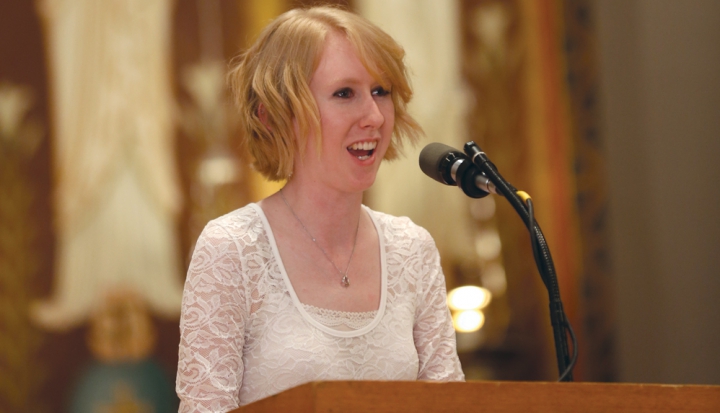At the start of the Triduum last year, a theater monk offered our group of lectors this advice: Do your homework. Tell the story.
The monks of Saint John’s Abbey invited me to proclaim the second reading at the evening Mass of the Lord’s Supper on Holy Thursday. The short piece from the first letter of St. Paul to the Corinthians takes us into the moment Jesus offers the bread and wine as his body and blood. I imagined the emotions of that Last Supper—feelings of fear, love, and uncertainty. I pictured the scene—close friends squeezed around a table, forks clanking, sharing laughs and tears.
Then I spoke Christ’s words from my heart, as if they were my own. I am a part of the body of Christ, so in some ways, they are mine. This is my body that is for you. Do this in remembrance of me. I hope the confidence of my voice, the emphasis I placed on words like body and you, conveyed even a little of the love Jesus poured out for his disciples—and for us—that night.
The practice of praying scripture out loud dates back to the earliest days of Christianity. In “The First Apology,” second-century saint Justin Martyr writes of how the community would come together on Sundays to read “the memoirs of the apostles or the writings of the prophets . . . as long as time permits.” The readings marked the opening of the eucharistic service.
As Christian worship developed, the Liturgy of the Word took a prominent role in the overall celebration. The Second Vatican Council’s Constitution on Divine Revelation declares, “From the table of both the word of God and the body of Christ [the church] unceasingly receives and offers to the faithful the bread of life, especially in the sacred liturgy.” By proclaiming the word of God, the lector nourishes the faithful. God’s very self speaks through the minister of the word (General Instruction of the Roman Missal). Lectoring is a big responsibility—and a deeply spiritual practice.
Proclaiming scripture out loud brings sacred stories of the past to life today. When I think about my vocation to lector, I am reminded of the beginning of John’s gospel: “And the Word became flesh and lived among us” (1:14). The Word became flesh—and the Word is still flesh today. Lectors breathe new life into words written thousands of years ago. It is a bold move to put my voice into the stories of biblical giants like Ruth, Moses, Abraham, Sarah, and especially Christ himself. Part of the beauty of proclaiming sacred texts out loud is the linking of past to present.
To the relief of those who, like Moses, feel nervous about speaking their own words, lectoring can be a welcomed opportunity. Much of the heavy lifting is done for us. The words are already written down, so the focus shifts from creating the content to finding ways to communicate the content creatively. The stories of scripture are filled with rich emotions—from the despair felt by Jonah in the belly of the whale to Elizabeth’s joy when Mary arrived to visit and everything in between. The lector is responsible for embodying the story’s emotions. She or he decides which words to emphasize, where to pause, and offers other verbal and nonverbal flavor. Father James A. Wallace, author of The Ministry of Lectors (Liturgical Press), calls lectors “instruments” of God. He writes, “The word of God to us will only reach its destination if it becomes the word of God through us.”
By acting as a vessel for God’s word, lectors are invited into deeper relationships with God themselves. Lectoring is ultimately a ministry of prayer or dialogue with God. Most lectors prepare by praying with their reading ahead of time. I ask questions like: What is God trying to say in this story? Who is this God who’s performing such marvelous deeds? How is God working through the other characters in the story? Engaging such questions not only helps me to communicate the story more effectively, but it also enhances my personal relationship with God. I’m spending time with God’s words. We’re talking in a real way.
Diana Macalintal, director of the office of worship for the Diocese of San Jose, developed a faith-sharing process for lectors. Some parishes gather the Sunday lectors and homilists together earlier in the week for an hour of communal prayer and discussion on the readings. Her process begins with a prayer to the Holy Spirit and invites the group to read both the gospel and the first reading aloud twice. The first time is just for listening. The second read is a time to note key words and phrases that are striking. Then the group shares. What struck you about the readings? What is going on in the life of the community, world, and our own lives right now that connects with the readings? Historically, what was happening at the time the story was written?
Then Macalintal asks the lectors to “discern the message God’s word is trying to communicate to your community in this time and place.” They also consider how the second reading fits into the central message. From there the lectors note the phrases in the reading that communicate the main message and practice reading these lines with special emphasis. My liturgy team in college followed the process laid out by Macalintal. I found it enriching to connect life today with life thousands of years ago. The process also helped me become more aware of the needs of my community.
As a spiritual practice, lectoring helps form the community. Ministers lector at liturgy, meaning we lector in a communal context. I feel united with my fellow parishioners when I’m standing at the ambo and able to make eye contact with them. I offer my voice and expressions. They engage me back with attentive nods and the response, “Thanks be to God,” when I conclude.
The community journeys though the liturgy together. We hear the same words proclaimed. While everyone experiences the words differently, there is something to be said for listening together. Thomas O’Loughlin, author of Explaining the Lectionary for Readers (Columba Press), notes, “We are worldwide one people, seeking to live as sisters and brothers, and we have a unity in listening and then in prayer.”
Catholic parishes around the world follow the same lectionary cycle. The same message I’m proclaiming in Collegeville is being shared in Rome, Buenos Aires, Cape Town, and beyond. Other Christian traditions follow different reading cycles, but the sharing of scripture out loud, together is a practice we all have in common. O’Loughlin continues, “Our unity as Christians, our unity in Jesus Christ, is expressed in the unity of the Liturgy of the Word throughout the whole church on that day.”
The spiritual practice of lectoring encompasses what Christian faith is about—gathering together as a community, sharing stories, praising God, and keeping the faith alive. In our words and in our actions, we make the Body of Christ known to the world.
This article also appears in the October 2017 issue of U.S. Catholic (Vol. 82, No. 10, pages 45–46).
Image: Jessie Bazan













Add comment